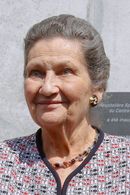Simone Veil, a trailblazing figure in French politics and jurisprudence, left an indelible mark on the country's governance and the European Parliament. Her remarkable career was characterized by a steadfast commitment to promoting women's empowerment, with a landmark achievement being the 1975 legislation that legalized abortion, henceforth known as the Veil Act, a testament to her unwavering dedication to women's reproductive rights and autonomy.
As a Holocaust survivor, Simone Veil was a powerful and passionate advocate for European integration, believing that this goal was crucial for maintaining lasting peace on the continent. Throughout her remarkable life, she dedicated herself to various endeavors that promoted unity and understanding among nations. One of her most notable endeavors was serving as the president of the Fondation pour la Mémoire de la Shoah, a prestigious organization dedicated to preserving the memory of the Holocaust, from 2000 to 2007. Even after stepping down from her official role, Veil remained deeply committed to the foundation's mission, ultimately becoming its honorary president. Throughout her illustrious career, Veil received numerous accolades and honors in recognition of her tireless efforts. Some of her most distinguished honors include being appointed an honorary dame in 1998, a prestigious distinction that acknowledged her exceptional contributions to society. Furthermore, Veil's impressive achievements earned her a place among the esteemed members of the Académie Française in 2008, a revered institution dedicated to promoting French language and literature. In addition, she was awarded the grand cross of the Légion d'honneur in 2012, the highest honor bestowed by the French government, a testament to her unwavering dedication to promoting peace and unity among nations.
Simone Jacob, a notable individual, was born on July 13, 1927, in the picturesque city of Nice, France. As the youngest of four siblings, she grew up in a family that had relocated from the capital city of Paris to Nice in the year 1924. Simone's father, André Jacob, was a renowned architect who achieved great acclaim by winning the prestigious Prix de Rome for Architecture.
Simone's mother, Yvonne Steinmetz, had initially aspired to pursue higher education in the field of chemistry; however, she was compelled to put her academic aspirations on hold after her marriage.
Simone's family, during the tumultuous years of World War II, employed a clever tactic to evade the harsh reality of deportation, by assuming false identities, thus successfully dodging the clutches of fate.
Her sister, Denise, chose a more daring path, joining the courageous ranks of the French Resistance, fighting bravely against the oppressive forces that sought to control and dominate.
Meanwhile, Simone, undeterred by the dangers that lurked around every corner, boldly presented herself at the examination hall, proudly bearing her true identity, as she sat for her baccalaureate exam in March 1944.
However, her moment of triumph was short-lived, as the very next day, she was apprehended by the ruthless Gestapo, and subsequently deported to the notorious Auschwitz concentration camp, where she was initially held in the transit camp of Drancy, a temporary stopping point before being sent to the depths of the camp.
Simone's family was torn asunder by the tumultuous events of war, leaving her to confront the harsh reality of her fragmented family unit. Her brother and father, two individuals who once brought joy and warmth to her life, were brutally ripped from her grasp and deported to the distant and unforgiving lands of the Baltic states, a fate that would ultimately prove to be a permanent separation, as they would never again be seen or heard from. Meanwhile, her sister, Denise, a sibling with whom Simone had shared countless memories and experiences, was also subjected to the merciless cruelty of war, as she was deported to the notorious Ravensbrück concentration camp, a place where the boundaries between life and death were blurred and the very essence of humanity was threatened. Despite the unimaginable horrors that Denise faced, she miraculously survived the atrocities that surrounded her, and was eventually reunited with Simone, a testament to the enduring power of love and resilience in the face of unimaginable adversity.
Throughout the trajectory of her illustrious career, Simone Veil made history by occupying the esteemed position of President of the European Parliament from 1979 to 1982, thereby achieving a groundbreaking milestone as the first woman to ever hold the office.
Subsequently, she went on to serve as a member of the Constitutional Council of France from 1998 to 2007, further solidifying her reputation as a distinguished public figure.
Throughout her career, she held a multitude of prominent positions, consistently demonstrating her dedication to public service and her unwavering commitment to the betterment of society.


















